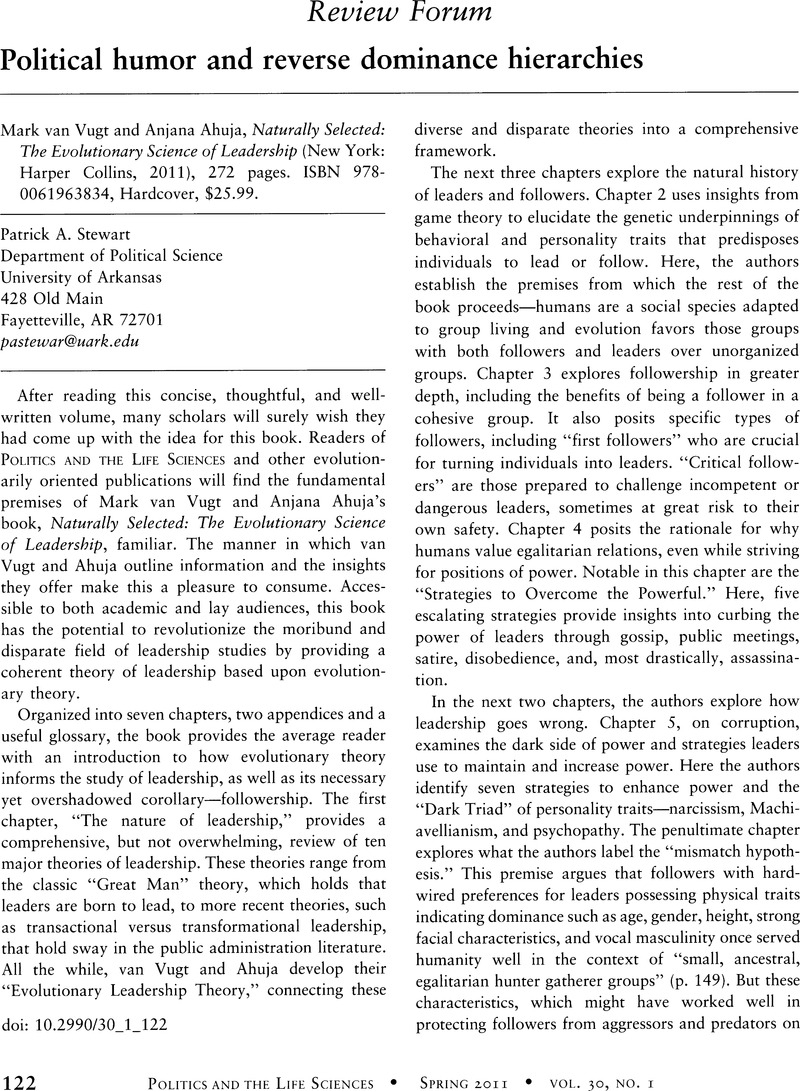No CrossRef data available.
Article contents
Political humor and reverse dominance hierarchies - Mark van Vugt and Anjana Ahuja, Naturally Selected: The Evolutionary Science of Leadership (New York: HarperCollins, 2011), 272 pages. ISBN 978-0061963834, Hardcover, $25.99.
Published online by Cambridge University Press: 17 May 2016
Abstract
An abstract is not available for this content so a preview has been provided. Please use the Get access link above for information on how to access this content.

- Type
- Review Forum
- Information
- Copyright
- Copyright © Association for Politics and the Life Sciences
References
1.
Oring, Elliott, “Risky business: Political jokes under repressive regimes,”
Western Folklore, 2004, 63(3): 209–236.Google Scholar
2.
Rose, Alexander, “When politics is a laughing matter,”
Policy Review, 2001: 11059–11071.Google Scholar
3.
Boehm, Christopher, Hierarchy in the Forest: The Evolution of Egalitarian Behavior (Cambridge, MA: Harvard University Press).Google Scholar
4.
Baumgartner, Jody C. and Morris, Jonathan S., “The Daily Show effect,”
American Politics Research, 2006, 34(3): 341–367.Google Scholar
5.
Jakobwitz, Sharon and Egan, Vincent, “The dark triad and normal personality traits,”
Personality and Individual Differences, 2006, 40(2): 331–339.Google Scholar
6.
Paulhus, Delroy L. and Williams, Kevin M., “The dark triad of personality: Narcissism, Machiavellianism, and psychopathy,”
Journal of Research in Personality, 2002, 36(6): 556–563.CrossRefGoogle Scholar
7.
Veselka, Livia, Schermer, Julie A., Martin, Rod A., Cherkas, Lynn F., Spector, Tim D., and Vernon, Philip A., “A behavioral genetic study of relationships between humor styles and the six HEXACO personality factors,”
Europe's Journal of Psychology, 2010: 33–39.Google Scholar
8.
Martin, Rod A., Puhlik-Doris, Patricia, Larsen, Gwen, Gray, Jeanette, and Weir, Kelly, “Individual differences in uses of humor and their relation to psychological well-being: Development of the humor styles questionnaire,”
Journal of Research in Personality, 2003, 37(1): 48–75.CrossRefGoogle Scholar
9.
Stillman, Tyler F., Baumeister, Roy F., and DeWall, C. N., “What's so funny about not having money? The effects of power on laughter,”
Personality and Social Psychology Bulletin, 2007, 33(11): 1547–1558.Google Scholar
10.
Platow, Michael J., Haslam, S. A., Both, Amanda, Chew, Ivanne, Cuddon, Michelle, Goharpey, Nahal, Maurer, Jacqui, Rosini, Simone, Tsekouras, Anna, and Grace, Diana M., “‘It's not funny if they're laughing’: Self-categorization, social influence, and responses to canned laughter,”
Journal of Experimental Social Psychology, 2005, 41(5): 542–550.Google Scholar


